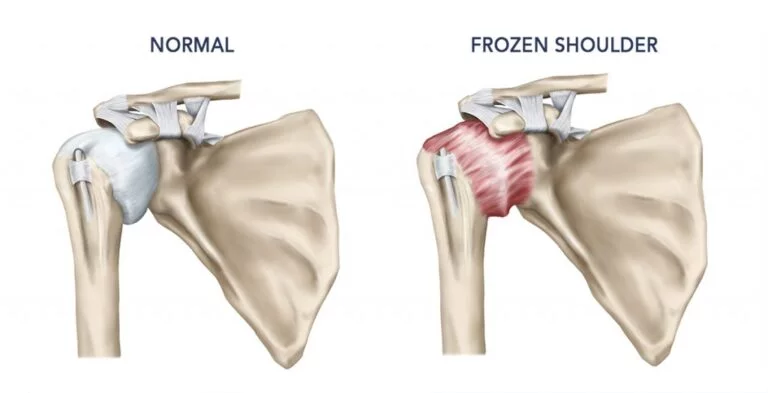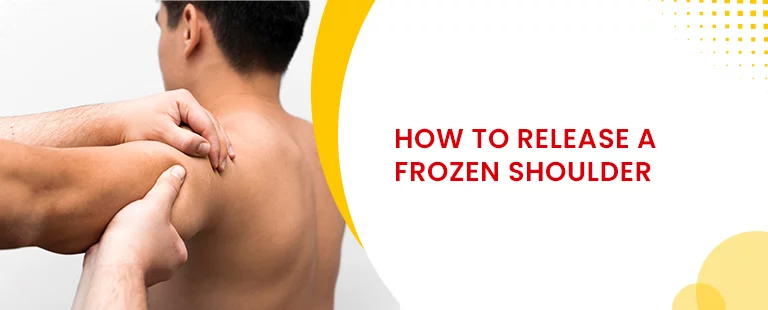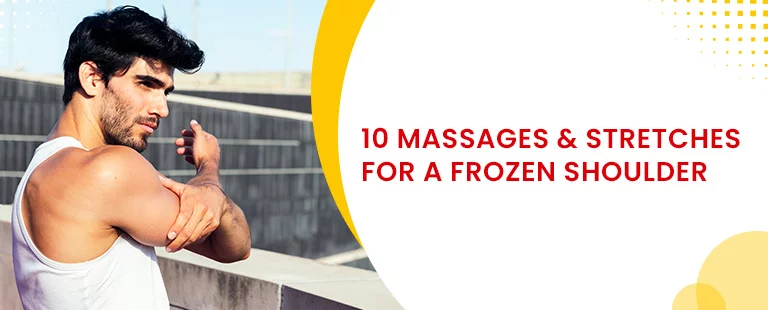Whether fastening a bra or taking a book off a shelf, even the simplest activities seem impossible when you have a frozen shoulder. Let’s know what exactly frozen shoulder is.
Frozen shoulder (adhesive capsulitis) is a disorder that causes stiffness and pain and hinders the range of motion in the shoulder. This disability can be hazardous and tends to worsen if not treated early. Women aged 40 to 60 are more prone to have frozen shoulders than men.
The cause of frozen shoulder is not understood completely, but an inflammatory process is probably involved. Due to the immobility of the shoulder for a long duration by injury or illness, freezing occurs in the shoulders. Fortunately, the affected shoulders can be unfrozen though it costs time and a lot of self-help.
The shoulder is a part that has a maximum range of motion. It pivots mainly on a ball-and-socket joint called a glenohumeral joint. It joins the top of the humerus to a scooped-out part of the scapula called the glenoid cavity.
Anatomy of a frozen shoulder

Usually, the head of the humerus moves smoothly in the glenoid cavity, a depression in the scapula. The frozen shoulder occurs when the capsule that protects the glenohumeral joint contracts and stiffens. Adhesions may also form between the head of the humerus and the joint capsule.
How does a frozen shoulder happen?
After an injury or inflammation of the soft tissues, primarily because of bursitis or tendonitis of the rotator cuff, the process of a frozen shoulder begins. The inflammation causes pain, which worsens with the disability of shoulder motion.
When the shoulder gets immobilised, the connective tissue surrounding the glenohumeral joint thickens and contracts, thus losing its capacity to stretch. If it is tried to avoid the pain due to shoulder movement, it further leads to capsule contraction. There is a space constraint in the humerus to move in, and the joint may lose synovial fluid, which is the reason behind its lubrication.
It may take two to nine months for a frozen shoulder to develop. Though the pain can gradually increase, stiffness continues, and the range of motion is limited unless pain relief for a frozen shoulder is utilised.
In the next paragraph, let us know how to cure frozen shoulders quickly and regard pain relief for frozen shoulders.
Frozen shoulder treatment
If you are looking for how to cure a frozen shoulder quickly or remedy a frozen shoulder, read below.
If you feel you have a frozen shoulder or you are developing one, visit your clinician for a physical exam for the frozen shoulder treatment. The clinician will ask you to perform a set of activities involving shoulder movement, such as touching the opposite shoulder by reaching across the chest. Next, they may take an x-ray scan to ensure no problem, such as arthritic changes. Finally, an MRI is ordered to check for a rotator cuff tear.
Relieving pain and restoring the normal range of motion are the main focus areas of frozen shoulder treatment. In addition, the clinician may advise an anti-inflammatory medication. Applying an ice pack or frozen bag to the shoulder for 10 to 15 minutes many times a day is pain relief for a frozen shoulder. You may also be given the corticosteroid injection into the soft tissues or shoulder. Ultimately, it is physical therapy, concentrating on stretching the joint capsule and strengthening it for an effective frozen shoulder treatment. A physical therapist will guide you regarding exercises. Once you learn them, you can practice them on your own.
Once you begin to work out to stretch the shoulder capsule, you should abstain from any activities that need overhead reaching, lifting, or anything similar. If you regularly exercise as per the physical therapist’s guidance, you will soon be able to resume your activity. Getting recovered from frozen shoulders takes time – maybe two to three years. If you see no progress, get back to your clinician or consult a shoulder expert to cure a frozen shoulder quickly. Rarely it requires surgery. It is how a frozen shoulder treatment is done.
Contact Germanten Hospitals for solutions to your frozen shoulder-related problems.



